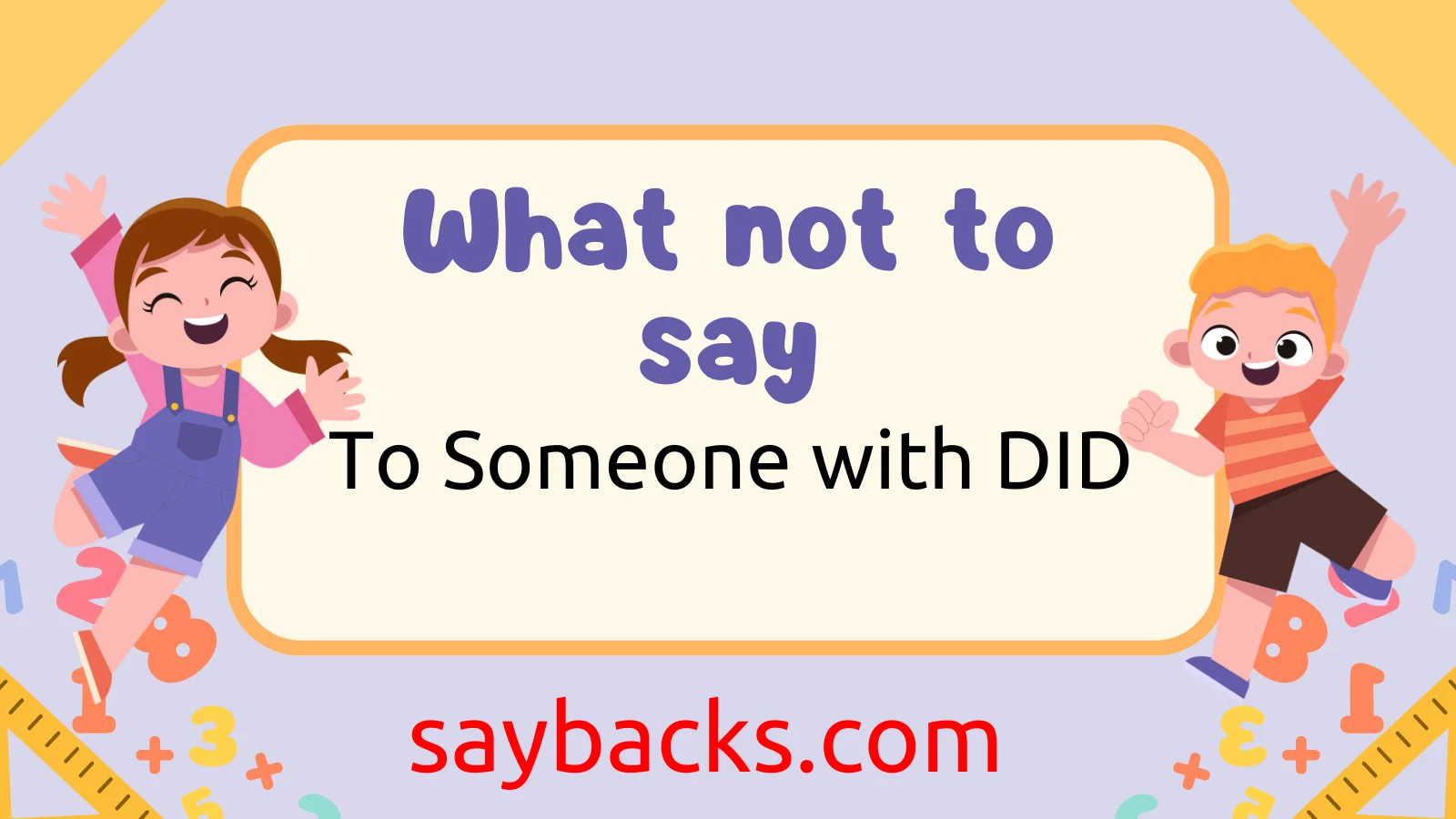Dissociative Identity Disorder (DID) is a complex mental health condition where an individual experiences two or more distinct identities or personality states. These identities may have different names, memories, and behaviors. What not to say to someone with DID is just as important as what you say, as certain words or phrases can be harmful, dismissive, or triggering.
In this article, we’ll explore common mistakes people make when speaking to someone with DID and provide guidance on how to communicate in a compassionate, respectful way.
1. “You’re faking it.”
Why This Is Harmful
Saying something like “You’re faking it” invalidates the person’s experience and dismisses the very real struggles they face. DID is a legitimate mental health disorder, and these dissociative states are not something that can be easily “turned on” or “off.”
How to Approach Instead:
Instead of questioning the legitimacy of their condition, try to express empathy. “I can’t fully understand what you’re going through, but I’m here to listen and support you.”
Why It Works:
This response shows that you’re open to understanding their experience without undermining their reality.
2. “Just focus and you’ll get better.”
Why This Is Harmful
Telling someone with DID to “just focus” can be incredibly frustrating for them. DID is not about lack of focus; it involves deep trauma and dissociative episodes. Suggesting that they “snap out of it” can feel dismissive and minimize the complexity of their experience.
How to Approach Instead:
A more understanding statement could be, “I understand this must be really difficult for you, and I’m here to help in any way I can.”
Why It Works:
This approach acknowledges the difficulty they’re facing and reassures them that they are not alone in their journey.
3. “You’re just looking for attention.”
Why This Is Harmful
This comment invalidates the person’s struggles and undermines their mental health. People with DID are not “seeking attention” — they are often navigating extremely challenging and distressing internal experiences that are out of their control.
How to Approach Instead:
Try saying, “I know you’re going through something very difficult, and I want to understand better.”
Why It Works:
This shows empathy and respect for their experience while creating a space for open dialogue.
4. “You don’t seem like you have DID.”
Why This Is Harmful
This statement can be hurtful because it implies that someone’s symptoms need to be outwardly visible or obvious to be real. DID manifests differently for each person, and just because someone doesn’t appear to be “acting different” at the moment doesn’t mean they aren’t experiencing dissociative states.
How to Approach Instead:
Say something like, “I know this can be a very complicated condition, and I’m here to listen if you want to talk about it.”
Why It Works:
This response demonstrates a non-judgmental attitude, encouraging them to share their experience without feeling the need to prove themselves.
5. “You’re just being dramatic.”
Why This Is Harmful
DID is not about being dramatic. It’s the result of coping with severe trauma and emotional distress. This comment minimizes the real, painful experiences someone with DID goes through.
How to Approach Instead:
Instead of dismissing their feelings, try saying, “It sounds like you’re going through a really tough time. How can I support you?”
Why It Works:
This response shows that you are willing to support them and are not dismissing their experiences as trivial.
6. “Why don’t you just integrate your personalities?”
Why This Is Harmful
The idea of “integrating” or “merging” personalities is often a goal in therapy for some individuals with DID. However, it is not something that can be easily or quickly done, and asking someone to “just integrate” is unrealistic and dismissive of the work required. This can also pressure them to follow a path that may not be the best for their healing process.
How to Approach Instead:
A better approach would be, “I understand that you’re working hard with your therapy, and I respect your journey. I’m here to help in any way I can.”
Why It Works:
This shows respect for their healing process and avoids pressuring them to achieve something before they’re ready.
7. “Can’t you just remember who you are?”
Why This Is Harmful
This statement oversimplifies a complex disorder. DID often involves the fragmentation of the self, and it’s not as simple as “remembering” who someone is. This can feel invalidating and frustrating.
How to Approach Instead:
Instead, say something like, “I know this must be incredibly difficult for you, and I’m here to support you through it.”
Why It Works:
By acknowledging the difficulty and expressing support, you offer a compassionate response that doesn’t minimize their condition.
Final Thoughts: What Not to Say to Someone with DID
When speaking with someone who has DID, it’s essential to approach the conversation with empathy, understanding, and respect. What not to say to someone with DID often involves comments that invalidate their experience, oversimplify their condition, or place unrealistic expectations on their healing.
By being mindful of your words and offering your support in an understanding way, you can help create a space where the individual feels heard, validated, and supported. Remember, the journey with DID is unique for each person, and patience, compassion, and respect go a long way.

